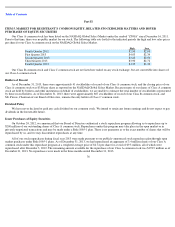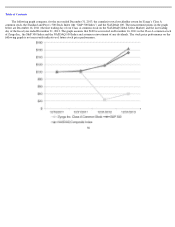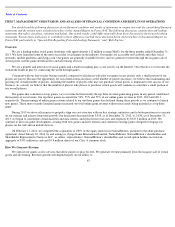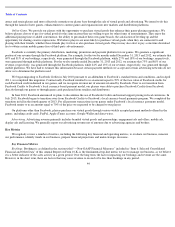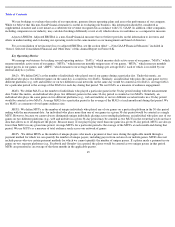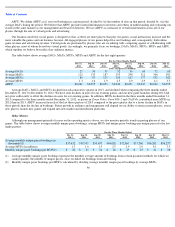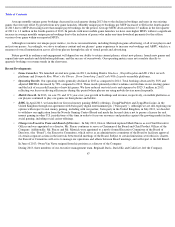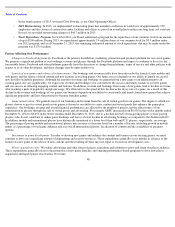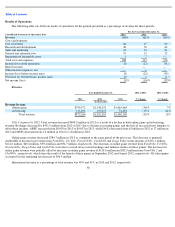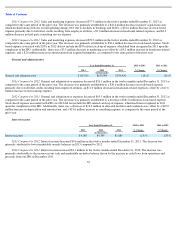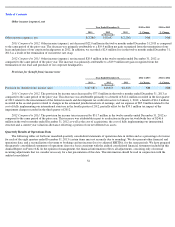Zynga 2013 Annual Report Download - page 48
Download and view the complete annual report
Please find page 48 of the 2013 Zynga annual report below. You can navigate through the pages in the report by either clicking on the pages listed below, or by using the keyword search tool below to find specific information within the annual report.
Table of Contents
attract and retain players and more effectively monetize our player base through the sale of virtual goods and advertising. We intend to do this
through the launch of new games, enhancements to current games and expansion into new markets and distribution platforms.
Online Game. We provide our players with the opportunity to purchase virtual goods that enhance their game-playing experience. We
believe players choose to pay for virtual goods for the same reasons they are willing to pay for other forms of entertainment. They enjoy the
additional playing time or added convenience, the ability to personalize their own game boards, the satisfaction of leveling up and the
opportunity for sharing creative expressions. We believe players are more likely to purchase virtual goods when they are connected to and
playing with their friends, whether those friends play for free or also purchase virtual goods. Players may also elect to pay a one-time download
fee to obtain certain mobile games free of third-party advertisements.
Facebook is currently the primary distribution, marketing, promotion and payment platform for our games. We generate a significant
portion of our revenue through the Facebook platform. For example, for the twelve months ended December 31, 2013 and 2012, we estimate that
69% and 81% of our bookings, respectively, were generated through the Facebook platform, while 27% and 18% of our bookings, respectively,
were generated through mobile platforms. For the twelve months ended December 31, 2013 and 2012, we estimate that 75% and 86% of our
revenue, respectively, was generated through the Facebook platform, while 24% and 13% of our revenue, respectively, was generated through
mobile platforms. We have had to estimate this information because certain payment methods we accept and certain advertising networks do not
allow us to determine the platform used.
We began migrating to Facebook Credits in July 2010 pursuant to an addendum to Facebook’s standard terms and conditions, and in April
2011, we completed this migration. Contractually, Facebook remitted to us an amount equal to 70% of the face value of Facebook credits for
each Facebook credit redeemed in our games, and we recognize revenue net of amounts retained by Facebook. Prior to our transition from
Facebook Credits to Facebook’s local currency-based payment model, our players were able to purchase Facebook Credits from Facebook
directly through our games or through game cards purchased from retailers and distributors.
In June 2012, Facebook announced its plans to discontinue the use of Facebook Credits and instead support pricing in local currencies. In
July 2013, Facebook began to transition away from Facebook Credits to Facebook’s local currency-based payments program. We completed the
transition in full in the fourth quarter of 2013. For all payment transactions in our games under Facebook’s local currency payments model,
Facebook remits to us an amount equal to 70% of the price we requested to be charged to our players
On platforms other than Facebook, players purchase our virtual goods through various widely accepted payment methods offered in the
games, including credit cards, PayPal, Apple iTunes accounts, Google Wallet and direct wires.
Advertising. Advertising revenue primarily includes branded virtual goods and sponsorships, engagement ads and offers, mobile ads,
display ads and licensing. We generally report our advertising revenue net of amounts due to advertising agencies and brokers.
Key Metrics
We regularly review a number of metrics, including the following key financial and operating metrics, to evaluate our business, measure
our performance, identify trends in our business, prepare financial projections and make strategic decisions.
Key Financial Metrics
Bookings. Bookings is as defined in the section titled “—Non-GAAP Financial Measures” included in “Item 6. Selected Consolidated
Financial and Other Data” of this Annual Report on Form 10-K, is the fundamental top-
line metric we use to manage our business, as we believe
it is a better indicator of the sales activity in a given period. Over the long term, the factors impacting our bookings and revenue are the same.
However, in the short term, there are factors that may cause revenue to exceed or be less than bookings in any period.
44




